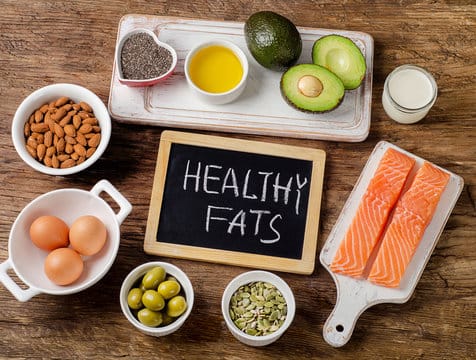Discover how foods with healthy fats for weight loss can enhance satiety, balance blood sugar, and fuel metabolism. Learn the top fat-rich foods that support sustainable weight management.
Foods with Healthy Fats for Weight Loss: A Smart Approach to Shedding Pounds
For years, dietary fat was wrongly blamed for weight gain. Today, science confirms what nutritionists have long suspected, the right kinds of fats can actually support weight loss. In fact, certain foods with healthy fats for weight loss can curb hunger, stabilize blood sugar, and rev up your metabolism—all without sacrificing flavor or satisfaction.
This guide reveals the best sources of healthy fats and explains how they can become powerful tools on your journey to a healthier body.
Why Healthy Fats Help with Weight Loss
They Keep You Full Longer
Healthy fats digest more slowly than carbs, helping you stay satisfied after meals. This means fewer cravings and less snacking. Polyunsaturated fats (PUFAs), like those in walnuts and flaxseeds, have been shown to improve satiety and help regulate appetite.
They Stabilize Blood Sugar
Pairing fats with carbohydrates helps slow the absorption of sugars, avoiding spikes and crashes. Avocados, rich in monounsaturated fats, also enhance insulin sensitivity, promoting better blood sugar control.
They Boost Metabolism
Omega-3 fatty acids, found in fatty fish, support fat-burning and reduce inflammation, which is often linked to obesity and insulin resistance.
They Improve Nutrient Absorption
Vitamins A, D, E, and K are fat-soluble, meaning your body needs fat to absorb them. These nutrients are crucial for everything from bone strength to immune function.
Top 7 Foods with Healthy Fats for Weight Loss
Incorporating these foods into your meals is a delicious and science-backed way to lose weight more effectively.
Avocados
Nutrients: Monounsaturated fats, fiber, potassium
Benefits: Associated with lower belly fat and improved BMI. Their fiber keeps you full and supports digestion.
Tip: Spread on toast, toss in salads, or blend into smoothies.
Fatty Fish (Salmon, Mackerel, Sardines)
Nutrients: Omega-3s, protein
Benefits: Support fat metabolism and heart health while reducing visceral fat.
Tip: Aim for two servings per week. Grill with olive oil and herbs.
Nuts and Seeds
Nutrients: MUFAs, PUFAs, fiber, magnesium
Benefits: Help control hunger hormones and reduce obesity risk. Walnuts and chia seeds are particularly beneficial.
Tip: Snack on a handful daily or sprinkle flaxseed into your oatmeal.

Extra Virgin Olive Oil
Nutrients: Monounsaturated fats, antioxidants
Benefits: Central to the Mediterranean diet, helps reduce LDL (bad) cholesterol and supports weight maintenance.
Tip: Use in salad dressings or for low-heat cooking.
Full-Fat Yogurt
Nutrients: CLA (conjugated linoleic acid), probiotics
Benefits: May reduce fat mass while improving gut health, which is linked to weight control.
Tip: Choose plain yogurt and top with berries and nuts.
Dark Chocolate (70%+ Cocoa)
Nutrients: Flavonoids, magnesium, iron
Benefits: Supports vascular health and can reduce sugar cravings in moderation.
Tip: Enjoy a small square after meals to satisfy your sweet tooth.
Eggs
Nutrients: Protein, choline, vitamin D
Benefits: A balanced source of fat and protein, eggs keep you fuller longer and don’t negatively affect blood cholesterol for most people.
Tip: Have them boiled, poached, or scrambled with veggies for a complete meal.
How to Add Healthy Fats the Right Way
Replace, Don’t Just Add
Instead of adding fats to an already calorie-rich meal, swap saturated fats like butter with unsaturated ones like olive oil or avocado.
Watch Your Portions
Fats are calorie-dense. Stick to reasonable serving sizes—like 1/2 an avocado, 1 tablespoon of olive oil, or a small handful of almonds.
Balance with Fiber and Protein
Combining healthy fats with protein and fiber improves fullness and blood sugar control. Think salmon with quinoa and greens or yogurt with chia seeds and berries.
Avoid Trans Fats
Steer clear of processed foods with trans fats (found in some baked goods and fried snacks), which promote inflammation and weight gain.
Common Myths About Fat and Weight Loss
Myth: Eating fat makes you fat.
Truth: Eating too many calories, not fat itself, leads to weight gain. In fact, healthy fats help reduce overeating by promoting fullness.
Myth: Low-fat diets are better for weight loss.
Truth: Studies show no significant advantage of low-fat diets over higher-fat ones when calories are controlled. Quality of fat matters more than quantity.
Final Thoughts
Fat is Your Friend—When It’s the Right Kind
All fats are bad,this idea is now outdated.When chosen wisely, foods with healthy fats for weight loss can transform your meals into powerful tools for appetite control, nutrient absorption, and metabolic health.
By embracing heart-healthy sources like avocados, nuts, fatty fish, and olive oil, you’re not just cutting calories—you’re fueling your body to burn them more efficiently.
So go ahead, drizzle that olive oil and enjoy your eggs. Healthy fats may be the missing ingredient in your weight-loss journey.